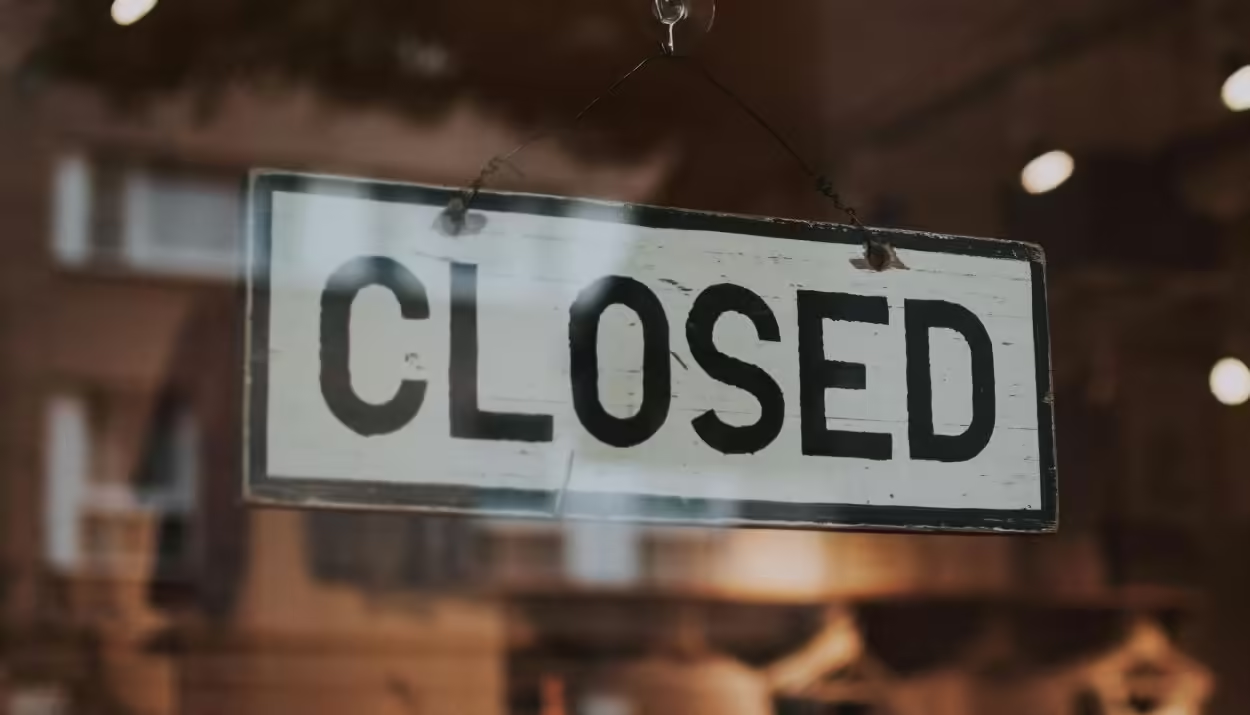In the business world success is fleeting and some companies know this better than others. Sustaining positive revenues and profits demands relentless effort. However, occasionally, unforeseen circumstances, be it human fallibility or market volatility, derail progress.
In Africa, companies like Tuskys, Nakumatt and Ellies which once dominated the market, have crumbled under the weight of internal conflicts, mismanagement, and mounting debts. The situation repeats itself across the continent, highlighting the harsh realities of business that even the biggest names couldn’t overcome.
Contents
1. Tuskys
Tuskys Supermarkets was one of Kenya’s leading retail chains in Kenya. The family-owned business had over 60 branches in the country.
However, things took a turn for the worse when Tuskys’ founder Joram Kago died in 2002. Although his children tried to manage the company, things started to unravel as control battles ensued among them in 2011. Accusations of mismanagement and embezzlement were thrown around.
By 2020, creditors started piling pressure on the retail chain over unpaid debts. Hotpoint, a domestic appliances company, filed an insolvency claim against Tuskys claiming that it was owed $1.9 million. Several other creditors came forward with non-payment claims spanning several years.
Tuskys debts were estimated to be $154.6 million against an asset base of $46.4 million. Consequently, in 2023, the High Court ordered the liquidation of the retail giant with Justice Manyanja maintaining that there was no hope of rescuing Tuskys.
2. Nakumatt
Like Tuskys, Nakumatt was a leading Kenyan supermarket chain. By 2015, the company had 65 stores across Kenya, Uganda, Tanzania and Rwanda. It had over 5500 employees and a revenue exceeding $450 million.
However, in 2016, the company started experiencing serious cash flow issues. By 2017 it could not pay its, rent suppliers or employees and could not meet its debt obligations. About 60 stores were closed. Although An administrator was appointed to help it regain financial footing, it was futile.
In 2019, the last six remaining Nakumatt stores were sold to Naivas, a Kenyan supermarket chain, in a deal worth $3.2 million.
In 2020, the company’s creditors, owed about $294.1 million, voted unanimously to dissolve the retailer.
3. Ellies Holdings
Ellies Holding was a South African electronics company dealing in the manufacture of industrial audio electronic and electrical equipment, satellite equipment as well as the distribution of TV aerials.
Ellies was a major supplier of MultiChoice’s hardware products including aerials, however when DSTV subscribers started to decline, Ellies’ business also suffered.
The company also made a significant investment in solar power products and inventory at a time when load-shedding was peaking and prices were high.
In January 2024, the company entered voluntary rescue after its proposed acquisition of alternative energy company Bundu Power fell through.
However, soon there was an oversupply and decreased demand which saw solar power prices drop significantly. As such the company found it difficult to make profits. These issues caused cash flow constraints which prompted Bankers to withdraw their support. The company’s proposed acquisition of Bundu Power also fell through.
In January 2024 the company entered voluntary rescue and in April, business rescue practitioner John Evans said there was no reasonable prospect of rescuing Ellies Holdings. He recommended that the company be liquidated.
That said, Ellies Electronics, a subsidiary of the company is still trading.
4. Crane Bank
Crane Bank Limited was a commercial bank in Uganda. The bank founded in 1995 by Sudhir Ruparelia was placed under statutory management by the Bank of Uganda (BOU) in September 2016 following a damning audit report that revealed insufficient capital levels, shrinking liquidity ratios, surging loan default levels and gross mismanagement, among others.
A month before the statutory intervention, the company had sought emergency financial support of $41 million, highlighting the lender’s financial troubles.
In 2017, DFCU acquired Crane Bank in a controversial transaction estimated at $56 million.
BOU then sued Crane Bank’s founder Rupelia. Rupelia was accused of embezzling $111.8 million from the now-defunct bank. The Central Bank lost the case in the High Court and Court of Appeal. Although it filed an appeal at the Supreme Court, the case was dismissed.
5. Uchumi supermarkets
Uchumi, one of Kenya’s oldest retail outlets, began operations in 1975 but has faced significant challenges over the years, including delayed salaries, rental arrears, and stock shortages.
The company exited the Tanzanian and Ugandan markets in 2015 after years of losses, and by 2019, it was teetering on the brink of collapse. With mounting debt and a shrinking branch network, Uchumi’s CEO sought a strategic partner to help clear debts and restore profitability.
However, the situation worsened, leading the company to plead for debt forgiveness amounting to billions of shillings.
At the time, Uchumi owed lenders about $23.1 million and suppliers $27.8 million, prompting the supermarket to file a creditors’ payment plan in the High Court.
A government task force attributed Uchumi’s downfall to overambitious expansion, cash-flow problems, costly lease terminations, and unsuitable merchandising policies. An audit by KPMG revealed widespread fraud involving staff and suppliers, further contributing to the retailer’s collapse.
Dishonest suppliers, in collusion with Uchumi employees, engaged in fraudulent activities, including recording the supply of goods that were never delivered.
Today, Uchumi’s franchising model which was previously touted as a potential rescue strategy seems to have stalled.
Mazars Consulting Ltd, overseeing Uchumi’s company voluntary agreement (CVA) plan, reported that while some progress has been made, such as settling about 82% of old debts, little has been done regarding the franchising model or efforts to engage the government in its economic transformation agenda.
Mazars expressed concern that these initiatives appear to have been sidelined or possibly abandoned by Uchumi’s management.
6. Mobius
Mobius Motors, a Kenyan company that aimed to revolutionize the African automotive market with rugged, affordable SUVs recently entered voluntary liquidation. This followed a year of unsuccessful rescue efforts.
Mobius which was founded by Joel Jackson in 2009 had been facing several financial challenges. The company struggled to pay its employees and had accumulated debt that it could not pay.
Although the company raised about $56 million throughout its lifetime, a Small market for new vehicles, high production costs and stiff competition from second-hand imported vehicles preferred by consumers were some of the problems that led to its downfall.
Struggling companies
The following companies have not shut down but are in financial distress and are unable to meet their debt obligations.
7. Tongaat Hulett
Tongaat Hulett is a South African sugar company that has been struggling financially for years. The company has a debt pile that is more than ten times its market value.
Moreover, the company was hit with an accounting scandal, SA’s second biggest after Steinhoff, which significantly hurt its prospects. Consequently, in 2022 the company entered business rescue due to an inability to meet its debt obligations.
Fifteen months later in January 2024, Tongaat’s creditors finally approved a business rescue plan.
Per the plan, Vision Consortium, comprising South Africa’s Terris Sugar, Guma from Mauritius, Remoggo from Zimbabwe and Almois Industries in Pakistan, will take over the business after buying over Tongaat Hulett’s $435.6 million debt through a partial debt-for-equity swap arrangement.
However, the plan seems to have recently hit a brick wall following an application by a small, unsecured creditor, Powertrans, led by its sole owner, Durban businesswoman Mohini Naidoo, who urged the court to set aside the business plan that had been agreed upon in January.
Powertrans claims that the circumstances under which Vision wants to take over Tongaat are unlawful and improper.
8. West Pack Lifestyle
West Pack Lifestyle, a leading retail brand entered voluntary business rescue in June.
“The board has recognised that the Company is financially distressed… specifically in that the Company is unable to pay its debts as they become due and payable now and within the succeeding 6 months,” a statement from CEO Jose Da Silva read.
The company attributed its financial trouble to an overly accelerated growth plan which strained its cash flows. It said the high capital cost of opening stores and the increased inventory mix depleted the company’s cash and ability to repay debt. Meanwhile, unsold inventory increased because of incorrect stocks and product mix.
The company said that working capital constraints prevented it from buying the right products to fix its product mix. Additionally, West Pack said that South Africa’s struggling economy and load-shedding caused further problems.
9. Pick n Pay
Pick n Pay, a major South African retailer is in serious financial trouble, having become technically insolvent and breaching all its debt covenants for the first time in its history.
For the year ending 25 February 2024, the retailer reported a 373% decline in net profit, shifting from a $63.7 million profit to a $174.2 million net loss. Basic earnings per share dropped from 243.37 cents to a loss of 661.67 cents per share.
This poor performance forced the retailer to increase its debt significantly, with total liabilities now exceeding total assets by $9.9 million. The company’s net debt-to-EBITDA ratio surged from 1.1 times to 6.3 times, far above its debt covenant threshold of 2.75 times.
In response, lenders have relaxed the covenants but required Pick n Pay to pledge 100% of its subsidiary Boxer’s shareholding as collateral, meaning Boxer could be sold if the debt isn’t repaid.
On the plus side, The company’s turnaround strategy seems to be taking as shareholders embrace it. A few days ago, Pick n Pay obtained shareholder approval for its recent rights offer, attracting $446.5 million in subscriptions.
10. MultiChoice
The owner of DStv, MultiChoice, recently fell into technical insolvency. The company recorded a $225 million loss in the last financial year. Multichoice attributed this significant decline to foreign exchange losses in Kenya, Nigeria, Zambia and Angola.
Additionally, poor acquisitions and business decisions hurt its DStv subscriber base. However, the planned Canal+ acquisition offers a potential solution to the multinational’s financial challenges.
11. Autozone
In July, Autozone, One of South Africa’s largest automotive parts retailers and wholesalers entered voluntary business rescue.
The company’s troubles began in 2014 when it underwent a private equity deal in 2014 which was funded by a significant amount of debt.
Unfortunately, AutoZone failed to meet its expectations, primarily due to the increasingly challenging South African economy. This was compounded by the Covid-19 pandemic, civil unrest, and a period of stagflation.
Despite a sales process being initiated to recapitalize AutoZone and debt service holidays being offered to the multinational by Absa Bank, the company remained at a break-even point.






